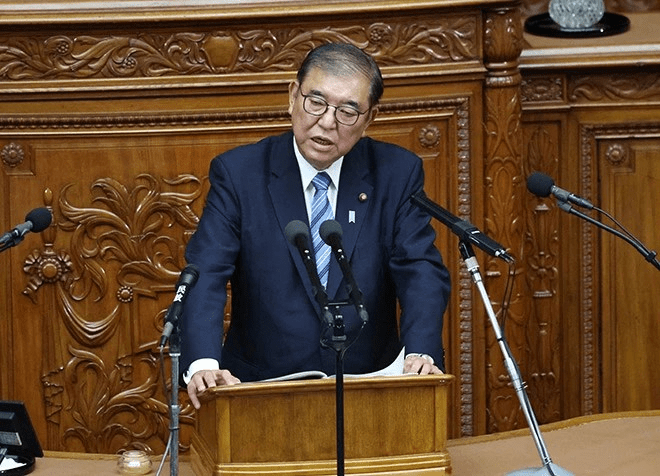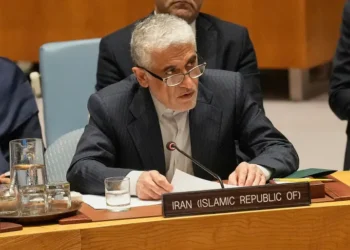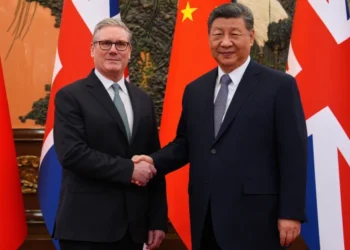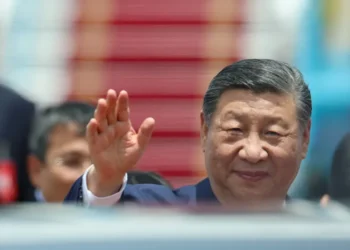Japan’s Prime Minister, Shigeru Ishiba has announced that he will resign.
Ishiba, who took office last October, said that he was stepping down as Prime Minister and as the Head of his conservative Liberal Democratic Party.
Ishiba’s decision to step down on Sunday, September 7, 2025, comes after he initially resisted calls from within his party to resign over the July parliamentary election loss.

He argued that he wanted to avoid a political vacuum at a time when Japan faces key domestic and international challenges, including US tariffs, rising prices and growing tensions in the Asia-Pacific.
Ishiba explained at a news conference that he had intended for some time to take responsibility for his party’s summer election loss, but was first determined to make progress in tariff negotiations with the United States.
He described it as matter of the national interest. “Who would seriously negotiate with a government whose leader says he is stepping down?” Ishiba said.
He stated that the moment had arrived with an order by US President Donald Trump on Friday to lower tariffs on Japanese cars and other products from 25% to 15%. “Having reached a milestone in the U.S. tariff negotiations, I decided now is the time to make way for a successor,” Ishiba said.
The resignation came one day before Ishiba’s party was to decide whether to hold an early leadership election, which would have amounted to a virtual no-confidence motion against him if approved.
He said that he made the “painful decision to resign” to avert that step because “it would cause a critical division within the party, and that is absolutely not my intention.”
Ishiba said that he would instead start a process to hold a party leadership vote to choose his replacement, which is expected to be held in October.
Ishiba will remain as Prime Minister until a new leader is elected and endorsed by the parliament.
Ishiba’s leadership that lasted only one year underscores the instability of Japan’s minority government.
Ishiba said thar he regrets he could not live up to voters’ expectations for change. “As a result, I failed to go my own way, and I wonder how I could have done better,” he said.
He stressed that he is not going to run in the next leadership race, even though he regrets leaving behind unfinished business, such as measures for salary increases, agricultural reforms and further strengthening Japan’s security. He asked his future successor to tackle the issues he cherished.
Ishiba’s Resignation Deepens Political Uncertainty
His resignation deepens the political uncertainty facing the world’s fourth-largest economy.
After assuming his role last October, the 68-year-old politician saw electoral defeats wipe out his coalition’s majority in both houses of parliament. The losses, stoked by voters’ concerns about the rising cost of living, made it more difficult for Ishiba’s government to implement its policy objectives.
In July, Ishiba’s ruling coalition failed to secure a majority in the 248-seat upper house in a crucial parliamentary election, weakening his government. The loss followed a defeat in the more powerful lower house, where the party-led coalition lost its majority in October, only two weeks after Ishiba took over.
Amid the country’s growing political instability, Ishiba was urged to resign by mostly right-wing opponents within his party, who viewed him as responsible for the results of July’s House of Councillors election.
Calls for Ishiba to step down grew after the Liberal Democratic Party last week called for a “complete overhaul” of the party following its losses.
Former Health Minister Norihisa Tamura said on a talk show of the public broadcaster NHK earlier on Sunday that the best way to heal party divisions and move forward is for Ishiba “to settle” the dispute before Monday’s vote.
Tamura stated that the party has already been distracted from necessary work on economic measures and on figuring out ways to gain opposition support in the next parliamentary session.
Possible candidates to replace Ishiba include Agriculture Minister Shinjiro Koizumi, as well as ultra-conservative former economic security minister Sanae Takaichi and Chief Cabinet Secretary Yoshimasa Hayashi, a moderate and the protege of former Prime Minister Fumio Kishida.
READ ALSO: Chief Justice Removal Triggers Question On Judicial Indepence, Impunity























